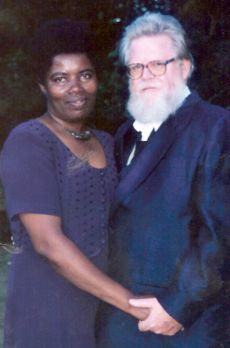|
English
Français
Português
Mi perfil
OER (Recursos Educativos Abierto)
Collective
My Sandbox
Featured L4C Participant

Los sermones de Phil
Si el entrenador hace las flexiones,
El atleta no se hará más fuerte
Traducido por Cristina Varela
Mis pensamientos ocasionales sobre el WikiEducador y su comunidad
- Teachers and taught. Thinking about the discussion on WikiEd about education best being a two way process between teachers and taught, I am reminded of one of the pillars of community empowerment, which is an emphasis on participatory methods. Participation in teaching and training is one way, and perhaps there are others, to help blur the line between teachers and taught, which is good, and to encourage the process as two way. One hindrance may be class discipline. Some teachers have an excessive need for complete class control, although it is doubtful that discipline is so important for good teaching and learning. When a teacher spends too much time and effort on class discipline, little is left over for creative and effective education. An important feature is an emphais on doing. Many educators on WikiEd see doing as more effective methods for teaching (and retention of the material) than listening or watching. It is certainly promoted on Community empowerment. The element of "doing" can be included in several ways, simulation games, field exercises with direct or indirect supervision, practice teaching in the class by students, and others. In the functional literacy module, it is recomended that the whole classroom structure be abandoned, and that students come to the room as if it were a planning session and plan methods, eg. field trips, to collect material for the content of the literacy course, then come back to that room to jointly create and develop signs or pamphlets using the words that were observed as important during the field trips. Examples could be fish prices in fishing communities, agricultural advice in farming communities. When adults are the students, respect for them is very important, and this is a way to show respect, for their input is not merely a made up exercise, but contributes to the course content, and produces a useful product in the end. With some imagination and creativity, we can expand the principles into a whole range of topics to be taught and learned.--Phil Bartle 23:44 6 jul 2009 (UTC)
- Thoughts from Al: If it is not a business it probably should not be run like one, Bravo, Phil. Here in the U.S. too many of our schools are run like a business. Unfortunately, that business is a factory, and it's product is preparing people for jobs in manufacturing. This made sense in the 1950s (maybe) but is poor preparation for the current times. This model has managed to take essential, rich and fascinating subjects like history, science, math, language (and most others) and make them BORING, obtuse, meaningless, and wholly disconnected from life as the students know it. It caters best to the elite, whose parents can supplement it, and whose school districts have the money and the foresight to raise the additional funds needed to offset the penurious and misdirected funds from the state. Higher Ed, for those who can afford it and can get in, seems to focus on preparing people for careers in Higher Ed--careers most college students don't necessarily want and likely won't get. --alboss 15:31, 13 June 2009 (UTC
- Are We Making Education Obsolete? A few pundits are saying that this decade is the era of the demise of commercial newspapers — the era of the citizen journalists. With the rise of Web 2.0 technology, blogs, social networks (eg Facebook), Twitter and alternate ways to use the Internet for non professionals to get heard, people are not buying newspapers as much as before. Advertisers, who fund newspapers far more than readers, are not seeing the circulation needed to warrant advertising, needed to keep newspapers afloat. (Such an irony, that a necessary element of democracy, an informed public, has been dependent upon the corporations). Newspapers and radios, in spite of token interaction such as letters to the editor and phone in shows where the hosts hold kill buttons, are designed with the idea of communication being one way, from the producer to the consumer, and were very slow to respond to reader or listener contributions, if at all.
- Now along come the educational Wikis, eg Wikipedia, WikiEducator, and the like, where their overt objective is to bring educational resources to anyone who wants them, free and open. This does not make education obsolete, but gives it a new incarnation, and may put a strain on the resources of traditional educational institutions. There is a big difference between the process of education and educational institutions. As the first is expanding into new dimensions, the second finds it must change or face the same end as the dodo bird. In the early stages of the industrial revolution, mass production required that one size fits all. Henry Ford said he would make cars any colour the buyers wanted, so long as they wanted black. Overworked teachers have to design their classes to fit the needs of middle and average students, leaving both the brightest and most needful with less that what they could be provided.
- Just as manufacturers are using new technology, computer enhanced, to produce a variety of products in response to consumer varieties, so the WikiEd technology opens new doors to providing a variety of educational services that can respond more quickly to user desires and needs.
- I cannot see, for the present, a computer being able to provide the rich and important environment like a live teacher in a live classroom (sometimes even too lively
 ). But what WikiEducator and Wikipedia can do is make information and teaching resources available to those live teachers, whether they live in a poor community in a poor country, or the opposite. ). But what WikiEducator and Wikipedia can do is make information and teaching resources available to those live teachers, whether they live in a poor community in a poor country, or the opposite.
- Education is not becoming obsolete; it is being reborn.--Phil Bartle 01:05, 25 June 2009 (UTC) ("Born Again" WikiEd)
- Necesitamos volvernos más cuidadosos cuando utilizamos la palabra “competente”. Existen ciertas organizaciones que simplemente no deberían ser gestionadas como negocios. Entre ellas, las organizaciones gubernamentales o religiosas, las familias y, como en el caso que nos ocupa, las organizaciones educativas. Sin pensarlo, en nuestra vida diaria pensamos que ser “competente” es lo mismo que ser prudente en los gastos, eficiente en la distribución de recursos y preciso en la contabilidad. Deberíamos serlo. Pero el término en cuestión tiene más implicaciones que necesitamos estudiar cuidadosamente. Una empresa con responsabilidad limitada es una persona legal, y ciertos psicólogos has descrito a esta persona como una bestia psicótica. Esto es así porque la ley apoya el objetivo de que una empresa tiene una sola ética, que es generar beneficios. No tiene obligación social alguna. Cada vez más, a las instituciones educativas se les está diciendo que sean “autosuficientes”, y menos dependientes de los fondos públicos. El resultado de esto está siendo la “comodificación” de la educación. Los cerificados y los títulos se están poniendo a la venta. Los estándares están bajado. El crecimiento de los valores de la propiedad intelectual, si bien es importante, es solamente uno de los elementos en este proceso, que solamente puede tener resultados desastrosos. El movimiento creciente del copyright abierto y compartido se está contrarrestando notablemente esta situación.--Phil Bartle 05:54, 13 June 2009 (UTC)
Archivos
Utilitidades
Contactos frecuentes
Our little band, y amig@s de Potenciacion Comunitaria
Comentarios de mis Wikivecinos
Please put your comments on the Discussion Page. Click on the discussion tab at the top of this page.--Phil Bartle 03:07 3 may 2009 (UTC)

|
Trabajo en proceso, espera cambios frecuentes. Tu ayuda y retroalimentación son bienvenidos.
Ver página de charlas.
|

|
|

